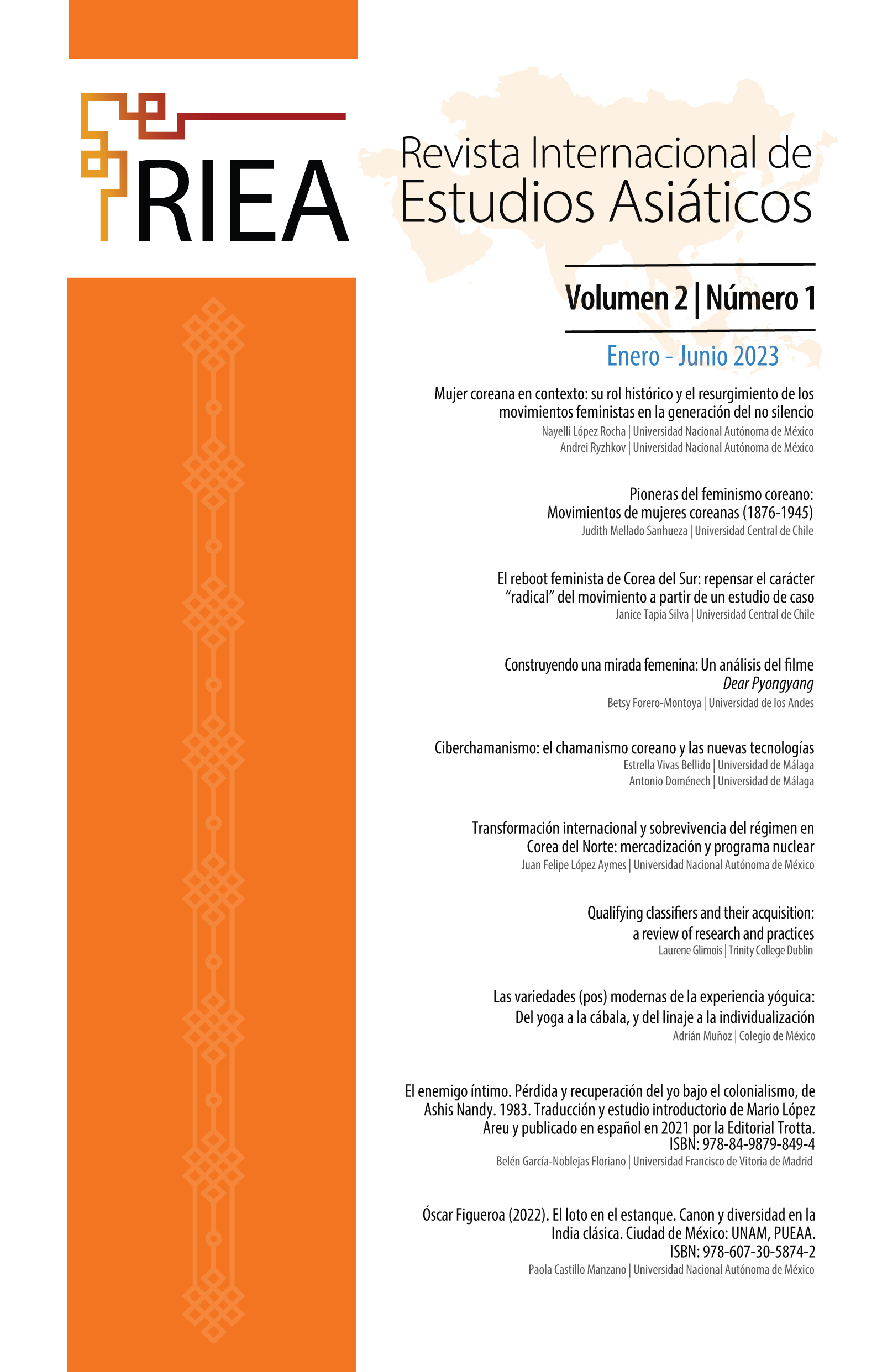Abstract
In recent years, there has been an increase in publications on Korean feminist movements, mostly those after 2000, which have self-defined themselves as the first feminist movements. However, Korean feminism was born at the end of the 19th century as a resistance against Confucian patriarchal politics and culture, and at the same time, as a way to strengthen activism against Japanese colonialism. This article is a documentary analysis with a descriptive scope. Among the main findings, it identifies and contextualizes the internal crisis of the Joseon kingdom, after its opening and the arrival of modernization, as a factor of origin of the movements, since it promoted the implementation of educational reforms that included women. It also highlights the Kunuhoe and Chanyanghoe, which allowed the development of the first feminist guidelines and the establishment of action mechanisms to insert themselves in the social and political spheres.
References
Baxt Solomon, Deborah. “Imperial Lessons: Discourses of Domination and Dissent in the 1929 Kwangju Student Protests”. Tesis doctoral, University of Michigan, 2009.
Bavoleo, Bárbara y Iadevito, Paula. “Mujeres, Sociedad Civil Y Proceso de Democratización En Corea Del Sur.” Estudios Internacionales 43. 164 (2009). https://doi.org/10.5354/0719-3769.2009.12608.
Cott, Nancy. The Grounding of Modern Feminism. Yale University Press. 1987. Obtenido de https://literariness.org/wp-content/uploads/2020/04/Nancy-F.-Cott-The-Grounding-of-Modern-Feminism-1989-Yale-University-Press.pdf
Cho, Lee Yeoul Cho. “The March 1st independence Movement led by teenage girls”. (일다, 2021, febrero 28). https://www.ildaro.com/8977
Choi, Hyaeweol. “Gender and mission encounters in Korea: New Women, old ways”. Berkeley: University of California Press. 2009.
Choi, Hyaeweol. “Wise Mother, Good Wife”. A Transcultural Discursive Construct in Modern Korea. The Journal of Korean Studies (1979-), 14(1). (2009): 1–33. http://www.jstor.org/stable/43998361
Choi, Hyaeweol. En Search of Knowledge and Selfhood: Korean Women Studying Overseas in Colonial Korea. Intersections: Gender and Sexuality in Asia and the Pacific, 29. (2012): 77-198. http://intersections.anu.edu.au/issue29/choi.htm
Del Valle, Verónica. "La cortesana y la mediadora", en e-Corea Procesos políticos, económicos y sociales en la península coreana, editado por Luciano Damián Bolinaga y Bárbara Bavoleo (Buenos Aires: Teseopress, 2018). https://www.teseopress.com/estudioscoreanos/
Dittrich, Klaus. “The beginnings of modern education in Korea, 1883–1910”. Paedagogica Historica 50, n.º 3 (2014): 265-66. https://doi.org/10.1080/00309230.2013.839723.
García Daris, Liliana. “La situación de la mujer en Corea, según las tradiciones en las distintas dinastías”. Consejo Argentino para las Relaciones Internacionales. (2006): 1-33. http://www.cari.org.ar/pdf/corea.pdf.
Hur, Song-Woo. “Mapping South Korean women’s movements during and after democratization: shifting identities”. En B. J., & B. V., East Asian Social Movements. Nonprofit and Civil Society Studies (An International Multidisciplinary Series). New York: Springer. (2011): 181-203.
Kim, Yung-Hee Kim. From subservience to autonomy: Kim Wonju’s “Awakening”. Korean Studies; Honolulu, 21, 1. (1997) https://www.proquest.com/docview/220296042/fulltextPDF/A01D67892C7B4124PQ/1?accountid=14619
Jayawardena, Kumari. Feminism and Nationalism in the Third World. (Verso, 2016): 216.
Jung-Kim, Jennifer. Gender and modernity in colonial korea. Tesis doctoral, 2005.. (Order No. 3316990). Available from ProQuest One Academic. (305032293).
MacKenzie, Federick. Korea's Fight for Freedom. New York: Fleming H. Revell Company. 1920. https://www.gutenberg.org/ebooks/13368
Najar, Valentina. “El Rol de La Mujer En Corea: Revisión de Hitos Históricos.” Online Journal Mundo Asia Pacifico 9. 16 (2020): 94–104. https://publicaciones.eafit.edu.co/index.php/map/article/view/6379/4841.
Park, Sunyoung. “Writing the real: Marxism, modernity, and literature in colonial korea, 1920–1941” (Order No. 3237311). Tesis doctoral, 2006. Available from ProQuest One Academic. (305355931). http://dti.sibucsc.cl/login
Robinson, Michael. Korea’s twentieth-century odyssey: A short history. University of Hawai’i Press. (2007): 60. http://catdir.loc.gov/catdir/toc/ecip075/2006038995.html
Wells, Kenneth. “The Price of Legitimacy: Women and the Kŭnuhoe Movement, 1927-1931”. In Colonial Modernity in Korea. (Leiden, The Netherlands: Harvard University Asia Center, 1999): 195 https://books.google.cl/books?id=JMVgNnkZXAQC&printsec=frontcover&hl=es&source=gbs_ge_summary_r&cad=0#v=onepage&q&f=false
Yuk, Suhwa. “The Education Movement of the royal family of the Empire of Great Han and Myeongshin Girls’ School”. Asian Women 31. n.º 1 (2015): 52-79. https://doi.org/10.14431/aw.2015.03.31.1.51.
Yun, Jeong-ran.“Christian women’s movement in Korean modern history and peace & unification movement”. International Journal of Korean History, 11. 2007: 83–96.


